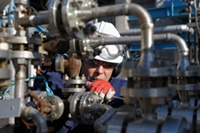 But tell that to residents who can light their tap water on fire…
But tell that to residents who can light their tap water on fire…Residents in the state of New York can now breathe a cautioned sigh of relief with the signing of an executive order December 11 by outgoing New York governor David Paterson that halts the practice of hydraulic fracturing in the state until the completion of a comprehensive review by the state Department of Environmental Conservation.
However, the executive order is only temporary, expiring July 1. And those who have the most to lose—including the potability of their water supply—are holding their collective breath as to the outcome of the review.
Hydraulic fracturing is a process whereby natural gas procurement agencies drill, on average, thousands of feet into the earth's surface to shale rock, where sufficient amounts of natural gas needed to keep homes and businesses in supply for decades to come, is trapped.
A cocktail of sand, water and chemicals is pumped into the shale under severe pressure to fracture the shale, releasing the precious gas from the depths. That gas, together with the excess soup from the mixture of water, sand and chemicals, is recovered and returned to the surface.
However, there has been concern that not all of the chemicals are making their way back to the surface. What's more, in most cases the drilling goes through underground aquifers to access the shale rock that lay underneath. Drilling apparatus and pipes that pass through underwater aquifers are encased in cement in an effort to protect the water supply.
People who live along the Delaware River basin—specifically in Delaware, New Jersey, New York and Pennsylvania—don't think for a minute that the precautions are working. That's because they can set their tap water on fire.
One member of "The Carter 15," a group of residents that filed a lawsuit against Cabot Oil and Gas in November of last year, took a television reporter into the darkness of a chicken coop. After filling a plastic water bottle with his garden hose, he stuck a pipe into the top of the container and lit a match.
The flame from the methane gas is unmistakable.
Another member of the group of plaintiffs pursuing the lawsuit indicated that he had lived in his home for in excess of 50 years. Only in the last two years has drinking water become a problem.
Cabot, while maintaining the safety of its drilling operations, is trucking potable water into the residents. But they have grown tired of living out of tanks and bottles, they say, and want a permanent, alternative water supply. They also want compensation for a perceived drop in the value of their homes.
New York City Mayor Michael Bloomberg, in November, called for a cautions approach to fracture drilling operations given recent concerns over the health of the Delaware River Basin, which is the source of water for more than half of the City of New York. In July, the US conservation group American Rivers put the Delaware on an endangered list due to threats from natural gas.
The Environmental Protection Agency (EPA) is reviewing its position on hydraulic featuring, and is set to issue an updated report some time in 2012. The EPA's previous position on fracking concluded that injection of hydraulic fracturing fluids posed "minimal threat" to underground sources of drinking water.
The EPA never said there would be zero threat. Just that in its view, it would be minimal.
That position dates back to 2004, and is cited by the hydraulic fracturing community as the basis for its position that fracking is "proven and safe," according to CNN on December 13.
Kathryn Klaber, president of the Marcellus Shale Coalition, described Governor Paterson's executive order as "misguided.
"Tightly regulated, environmentally sound natural gas development in New York can and will deliver a much-needed and long-lasting economic shot in the arm...for the entire state, just as it is in Pennsylvania, West Virginia and elsewhere," Klaber said in a written statement.
READ MORE FRACKING LEGAL NEWS
However, in Pennsylvania, tell that to the fellow who can light his tap water with a match. And tell that to his neighbor, who has a methane gas release pipe now permanently in his front yard. That family's well was confirmed poisoned by the Department of Environmental Protection in Pennsylvania, which now requires Cabot to supply clean water to area residents.
In the meantime, the New York moratorium will expire well ahead of the EPA's expected release date for its update on environmental policy for hydraulic fracturing. And affected residents, who have been "fracked," continue to see their drinking water, and their property values, negatively impacted.
